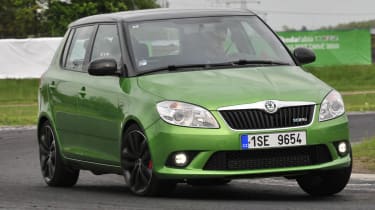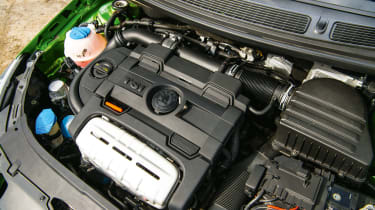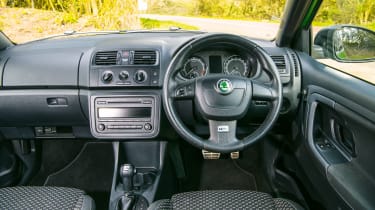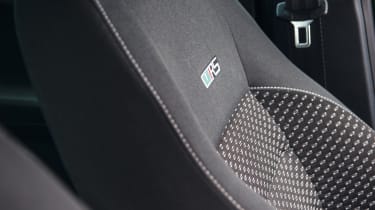Skoda Fabia vRS (2010-2014): review, specs and buying guide
A great all-rounder with a clever engine, the second-generation Skoda Fabia vRS starts at just £5000. But beware of the pitfalls.
The original Skoda Fabia vRS forged a new niche in the hot hatchback segment with its use of diesel power in 2003. The lusty, 1.9-litre turbodiesel delivered strong mid-range grunt and impressive fuel economy. It was a hit with us and its owners.
Skoda unveiled its successor in 2010 opting for a petrol rather than a diesel engine – a decision met with some disappointment. The new 1.4-litre four-cylinder TSI Twincharger engine was equally unique though, employing two methods of forced induction, turbocharging and supercharging. The combination resulted in 178bhp, delivered in a smooth, linear fashion thanks to the forced induction boost across the rev range and with the help of a seven-speed DSG gearbox. 0-62mph was thus dispatched in 7.3sec and top speed of 139mph was achievable. Still the fastest Fabia to date, it was a strong all-round package, but it couldn’t conjure the same immersive experience as period rivals such as the Renault Sport Clio in 197 or 200 guises.
The Fabia vRS came generously specced as standard: air con, 17in alloy wheels and brilliant vRS branded sport seats all featured. Many left the factory with the optional contrasting roof (finished in white or black) and black wheels.
More reviews
Retailing at £15,500, the vRS was good value and the more practical estate model could be had for a £795 premium. Indeed, the vRS wagon featured in the evo FastFleet back in 2012 covering 12,500 miles and providing plenty of pleasure with little pain. What was worthy of note though was the high oil consumption which seemed to be a foible of the engine.
Research the vRS and the theme of excessive oil consumption emerges as a common one, and you’ll also come across stories of engine rebuilds and replacements, which seem far too common and will restrict the hot Fabia’s appeal. As with many stories online, they’re blown somewhat out of proportion but you should certainly be careful when considering purchasing a Mk2 Fabia vRS.
The standard three-year manufacturer warranty will have expired on all cars, but some later examples are still covered by the five-year extended warranty plan and are worth seeking out. Otherwise, forking out for third party cover is something we’d recommend.
Specs
| Engine | In-line 4-cylinder, 1390cc, twincharger |
| Max power | 178bhp @ 6200rpm |
| Max torque | 184lb ft @ 2000-4500rpm |
| Transmission | Seven-speed DSG, front-wheel drive |
| Weight | 1218kg |
| Power-to-weight | 148bhp/ton |
| 0-62mph | 7.3sec (claimed) |
| Top speed | 139mph (claimed) |
| Price new | £15,500 (2010) |
Checkpoints
Engine
Research will lead you to believe the twincharger engine failing is an inevitability, but that simply isn’t the case. Ed Jackson of VW Group specialist APS outlined the engine’s problems, which are largely suffered by cars running the CAVE-coded engine which was phased out in late-2012. The excessive oil consumption can be attributed to defective pistons, while misfiring – another common issue – caused by the PCV (positive crankcase ventilation) pushing oil into the intake, can cause irreparable engine failures in the worst cases. The heavily revised CHTE engine introduced in late 2012 addressed many of the issues – a sticker at the bottom of the driver’s door pillar will show what engine the car has.
Of the 2900 Mk2 Fabia vRSs on UK roads, about 1800 have the CAVE engine with the remaining 1100 fitted with the later, uprated unit according to briskoda.net, which also estimates that a third of the CAVE engined-fitted examples have suffered engine problems. Incidentally, the CHTE unit has proved much more reliable. ‘Obviously you’re better going for the later engine,’ says Ed. ‘That said, if an early engine has now done 50,000 miles without problems, then it’s probably going to be OK. Look for a film of oil in the exhaust, or oil spray on the back of the car after a run. And if there’s an oil container in the boot, that’s probably a sign it needs regular topping up!’
You can do your bit to stave off potential issues: avoid regular short journeys, change the spark plugs every other year or 20,000 miles, use good quality oil and plump for premium unleaded when possible.
The engine is ripe for modification, plenty of tuning houses offer cold air intakes and freer-flowing exhausts that pair well with remaps which can push power and torque beyond 200bhp and 200lb ft respectively. Adding more performance, though, can exacerbate the known problems, so keep in mind that modified engines will require more maintenance.
Transmission
On the whole, the seven-speed DSG gearbox is robust. The mechatronic unit could fail, resulting in a loss of drive, but this has only affected a few cars. To prevent further cases, a service campaign, 34F7, starting in the spring of 2014 saw the synthetic-based oil used for gear lubrication swapped out for a mineral-based oil – a software update was instructed, too.
Skoda dealers should be able to tell you whether the car you’re considering has undergone the service action. Also check the service book for note to confirm the work was carried out, and peek in the wheel-well of the boot where you should find a sticker providing further evidence. On the test drive, try the ’box in both modes (Sport locks out the final ratio) and make sure it shuffles through the gears smoothly and snappily without any low-speed jerkiness.
Suspension, steering and brakes
There are no known issues to raise here, so any odd noises emanating from the suspension probably signal the car hasn’t been properly maintained.
Body, interior and electronics
Suffice to say, any dashboard warning lights should be taken seriously, and it’s also worth having the ECU read for fault codes.
Prices
Parts
Prices from autops.co.uk. Tyre price from blackcircles.com. All prices include VAT but exclude fitting charges and are correct at the time of publishing.
| Tyres (each) | £96.53 (Michelin Pilot Sport 3) |
| Front pads (set) | £73.20 |
| Front discs (pair) | £120.00 |
| Damper (single) | £98.36 |
| Spark plugs (set) | £63.26 |
Servicing
Prices from autops.co.uk, including VAT. Service at 12 months or 10,000 miles, whichever is sooner. Prices are correct at the time of publishing.
| Minor service | £140 |
| Major service (at 40,000 miles) | £295 (includes spark plugs, air filter, air filter, pollen filter, etc) |



